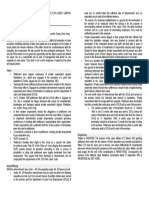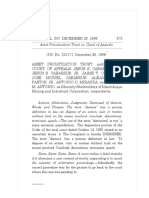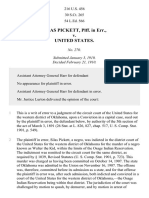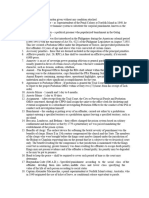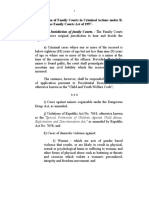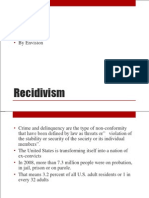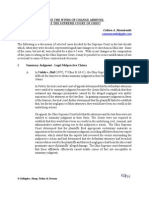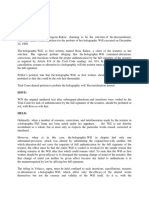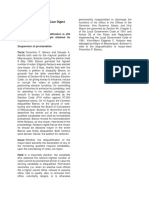Professional Documents
Culture Documents
09 Price Vs Innodata
09 Price Vs Innodata
Uploaded by
Paolo Miguel Arquero0 ratings0% found this document useful (0 votes)
37 views2 pages1) The petitioners were employed as formatters by Innodata, which was engaged in data encoding and conversion. They signed one-year fixed term employment contracts that expired after a year, at which point Innodata terminated their employment.
2) The court ruled that the petitioners were regular employees, not under valid fixed term contracts, because their work formatting data was necessary to Innodata's regular business. Employment status is defined by law, not contracts, and labor contracts must comply with the common good and labor laws.
3) As regular employees, the petitioners could not be dismissed without just cause, making their termination after the contracts expired illegal dismissal.
Original Description:
Original Title
09 Price vs Innodata
Copyright
© © All Rights Reserved
Available Formats
DOCX, PDF, TXT or read online from Scribd
Share this document
Did you find this document useful?
Is this content inappropriate?
Report this Document1) The petitioners were employed as formatters by Innodata, which was engaged in data encoding and conversion. They signed one-year fixed term employment contracts that expired after a year, at which point Innodata terminated their employment.
2) The court ruled that the petitioners were regular employees, not under valid fixed term contracts, because their work formatting data was necessary to Innodata's regular business. Employment status is defined by law, not contracts, and labor contracts must comply with the common good and labor laws.
3) As regular employees, the petitioners could not be dismissed without just cause, making their termination after the contracts expired illegal dismissal.
Copyright:
© All Rights Reserved
Available Formats
Download as DOCX, PDF, TXT or read online from Scribd
Download as docx, pdf, or txt
0 ratings0% found this document useful (0 votes)
37 views2 pages09 Price Vs Innodata
09 Price Vs Innodata
Uploaded by
Paolo Miguel Arquero1) The petitioners were employed as formatters by Innodata, which was engaged in data encoding and conversion. They signed one-year fixed term employment contracts that expired after a year, at which point Innodata terminated their employment.
2) The court ruled that the petitioners were regular employees, not under valid fixed term contracts, because their work formatting data was necessary to Innodata's regular business. Employment status is defined by law, not contracts, and labor contracts must comply with the common good and labor laws.
3) As regular employees, the petitioners could not be dismissed without just cause, making their termination after the contracts expired illegal dismissal.
Copyright:
© All Rights Reserved
Available Formats
Download as DOCX, PDF, TXT or read online from Scribd
Download as docx, pdf, or txt
You are on page 1of 2
[How to deal with doubts in employment contract interpretation] Innodata argued that it was constrained to hire new employees
strained to hire new employees for a fixed period
09 PRICE V. INNODATA of not more than one year.
September 30, 2008 | Chico-Nazaro, J. | G.R. No. 178505 ○ They asserted that the petitioners were not illegally dismissed since their
employment was terminated due to the expiration of their terms of
Petitioner/s: Cherry J. Price, Stephanie G. Domingo and Lolita Arbilera employment and that petitioners were estopped from asserting a position
Respondent/s: Innodata Phils., Inc.,/Innodata Corporation, Leo Rabang and Jane contrary to the contracts which they had entered into knowingly, voluntarily
Navarette and wilfully.
● The LA found the petitioners’ complaint for Illegal dismissal and damages
Doctrine: The employment status of a person is defined and prescribed by law and meritorious. It ordered full reinstatement and backwages.
not by what the parties say it should be. ○ The LA held that as formatters, the petitioners occupied jobs that were
necessary, desirable and indispensable to the business of Innodata and that
Equally important to consider is that a contract of employment is impressed with
by the very nature of their work, they should be considered regular
public interest such that labor contracts must yield to the common good. Thus, employees of Innodata who were entitled to security of tenure.
provisions of applicable statutes are deemed written into the contract, and the parties ● Upon appeal to the NLRC, the decision of the LA was reversed and Innodata
are not at liberty to insulate themselves and their relationships from the impact of was absolved of the charge of illegal dismissal.
labor laws and regulations by simply contracting with each other. ○ The NLRC found that petitioners were not regular employees, but were
fixed-term employees as stipulated in their respective contracts of
Under the Labor Code, the applicable test to determine whether an employment employment.1
○ The determining factor of such contracts is not the duty of the employee but
should be considered regular or non-regular is the reasonable connection between
the day certain agreed upon by the parties for the commencement and
the particular activity performed by the employee in relation to the usual business or termination of the employment relationship.
trade of the employer. ○ The NLRC observed that the petitioners freely and voluntarily entered into
the fixed-term contracts and, as such, Innodata was not guilty of illegal
Fixed-term employment contracts are the exception rather than the general rule. dismissal when it terminated employment upon their contracts’ expiration..
○ The petitioners’ MR was denied by the NLRC.
Facts: ● The case was brought before the CA under R65 and the CA sustained the ruling
● Innodata was a domestic corporation engaged in the data encoding and data of the NLRC that the petitioners were not illegally dismissed.
conversion business. It employed encoders, indexers, formatters, and others to ○ Petitioners admitted entering into contracts of employment with Innodata for
maintain its business and accomplish job orders of its clients. a term of only one year and for a project called Earthweb.
○ Resp. Leo Rabang was the HR Manager; Resp. Jane Navarette was Project ○ The CA also stated that there was no showing that they entered into the
Manager fixed-term contracts unknowingly or involuntarily and that the parties dealt
○ Innodata had since ceased operations due to business losses in 2002. with each other on more or less equal terms, with no moral dominance
● Pets. Price, Domingo and Arbilera were employed as formatters. exercised on the petitioners by Innodata.
○ The parties executed a “Contract of Employment for a Fixed Period” wherein ○ The CA expounded that in fixed-term contracts, the stipulated period of
it was stipulated that their employment would last for one year, until employment is governing and not the nature thereof. Even though the
February 16, 2000. petitioners were performing functions that are necessary and desirable, they
○ On such date, Rabang, as HR Manager, wrote a letter to petitioners, did not become regular employees due to the fixed term.
informing them of their last day of work as their employment had already ○ The contracts were also not imposed to preclude them from acquiring
ceased due to the end of their contract. security of tenure.
● Petitioners filed a Complaint for illegal dismissal and damages against Innodata, ○ MR denied.
Rabang and Navarette.
○ They claimed that they should be considered regular employees since their Ruling:
positions as formatters were necessary and desirable to the usual business W/N petitioners were hired under fixed-term employment contracts – NO. There
of Innodata as an encoding, conversion and data processing company. were no valid fixed-term contracts and petitioners were regular employees who could
○ They also argued that they could not be considered project employees not be dismissed except for just or authorized cause.
considering that their employment was not coterminous with any project or ● The employment status of a person is defined and prescribed by law and not by
undertaking, the termination of which was predetermined. what the parties say it should be.
● Innodata explained that the bulk of the work that the company was engaged in
involved data processing and encoding and that almost half of its employees did
1
data encoding work. Due to the wide range of services rendered to its clients, The NLRC applied Brent School, Inc. v. Zamora and St. Theresa’s
School of Novaliches Foundation v. National Labor Relations Commission, in which
this Court upheld the validity of fixed-term contracts.
○ Equally important to consider is that a contract of employment is impressed ○ “Project employees” as those workers hired (1) for a specific project or
with public interest such that labor contracts must yield to the common good. undertaking, and wherein (2) the completion or termination of such project
○ Thus, provisions of applicable statutes are deemed written into the contract, has been determined at the time of the engagement of the employee.
and the parties are not at liberty to insulate themselves and their ● Under Section 3, Article XVI of the Constitution, it is the policy of the State to
relationships from the impact of labor laws and regulations by simply assure the workers of security of tenure and free them from the bondage of
contracting with each other. uncertainty of tenure woven by some employers into their contracts of
● Under the Labor Code, the applicable test to determine whether an employment employment.
should be considered regular or non-regular is the reasonable connection ● Unless they have exceeded their authority, corporate officers are, as a general
between the particular activity performed by the employee in relation to the usual rule, not personally liable for their official acts, because a corporation, by legal
business or trade of the employer. fiction, has a personality separate and distinct from its officers, stockholders and
○ In the case at bar, the primary business of Innodata is data encoding, and members.
the formatting of the data entered into the computers is an essential part of ○ In the absence of evidence that they acted with malice or bad faith herein,
the process of data encoding. the Court exempts the individual respondents, Leo Rabang and Jane
○ Formatting organizes the data encoded, making it easier to understand for Navarette, from any personal liability for the illegal dismissal of petitioners.
the clients and/or the intended end users thereof. Undeniably, the work
performed by petitioners was necessary or desirable in the business or trade Dispositive
of Innodata. WHEREFORE, the Petition for Review on Certiorari is GRANTED. The Decision
● Under the Civil Code, fixed-term employment contracts are not limited, as they dated 25 September 2006 and Resolution dated 15 June 2007 of the Court of
are under the present Labor Code, to those by nature seasonal or for specific Appeals in CA-G.R. SP No. 72795 are hereby REVERSED and SET ASIDE.
projects with predetermined dates of completion; they also include those to which Respondent Innodata Philippines, Inc./Innodata Corporation is ORDERED to pay
the parties by free choice have assigned a specific date o termination. petitioners Cherry J. Price, Stephanie G. Domingo, and Lolita Arbilera: (a) separation
○ The decisive determinant in term employment is the day certain agreed upon pay, in lieu of reinstatement, equivalent to one month pay for every year of service, to
by the parties for the commencement a termination of their employment be computed from the commencement of their employment up to the date respondent
relationship, a day certain being understood to be that which must Innodata Philippines, Inc./Innodata Corporation ceased operations; (b) full
necessarily come, although it may not be known when. backwages, computed from the time petitioners’ compensation was withheld from
○ Seasonal employment and employment for a particular project are instances them up to the time respondent Innodata Philippines, Inc./Innodata Corporation
of employment in which a period, where not expressly set down, is ceased operations; and (3) 10% of the total monetary award as attorney’s fees. Costs
necessarily implied. against respondent Innodata Philippines, Inc./Innodata Corporation.
● While this Court has recognized the validity of fixed-term employment contracts,
it has consistently held that this is the exception rather than the general rule. Notes
More importantly, a fixed-term employment is valid only under certain In Brent, the very same case invoked by respondents, the Court identified several
circumstances. [See Notes] circumstances wherein a fixed-term is an essential and natural appurtenance, to
● Even assuming that petitioners’ length of employment is material, given wit: Some familiar examples may be cited of employment contracts which may be
respondents’ muddled assertions, the SC adhered to its pronouncement in neither for seasonal work nor for specific projects, but to which a fixed term is an
Villanueva v. National Labor Relations Commission, 295 SCRA 326 (1998), to essential and natural appurtenance: overseas employment contracts, for one, to
the effect that where a contract of employment, being a contract of adhesion, is which, whatever the nature of the engagement, the concept of regular employment
ambiguous, any ambiguity therein should be construed strictly against the party with all that it implies does not appear ever to have been applied, Article 280 of the
who prepared it. Labor Code notwithstanding; also appointments to the positions of dean, assistant
○ The SC concluded that petitioners’ contracts of employment became dean, college secretary, principal, and other administrative offices in educational
effective on 16 February 1999, and that they were already working institutions, which are by practice or tradition rotated among the faculty members, and
continuously for Innodata for a year. where fixed terms are a necessity without which no reasonable
● Innodata’s contention that petitioners were project employees was also specious rotation would be possible.
and devoid of merit, according to the SC.
You might also like
- Case DigestDocument4 pagesCase Digestdenzellefabros100% (1)
- 008 Price V InnodataDocument3 pages008 Price V Innodatamiss.escober100% (1)
- 068 Price V InnodataDocument3 pages068 Price V InnodataGui EshNoch keine Bewertungen
- Price V InnodataDocument3 pagesPrice V InnodataGian ChuaNoch keine Bewertungen
- 05 Price - BPI Syllabus Page 5Document24 pages05 Price - BPI Syllabus Page 5Karla BeeNoch keine Bewertungen
- 05 Price - BPI Syllabus Page 5Document24 pages05 Price - BPI Syllabus Page 5Karla BeeNoch keine Bewertungen
- 068 Price v. InnodataDocument3 pages068 Price v. InnodataJustin Moreto50% (2)
- Labor Law Case Digest: Jamias Et Al. v. NLRC G.R. No. 159350 March 9, 2016 Bersamin, J.: FactsDocument2 pagesLabor Law Case Digest: Jamias Et Al. v. NLRC G.R. No. 159350 March 9, 2016 Bersamin, J.: FactsKaye Stephanie SorrosaNoch keine Bewertungen
- G.R. No. 159350 March 9, 2016 Bersamin, J.:: Jamias Et Al. v. NLRCDocument2 pagesG.R. No. 159350 March 9, 2016 Bersamin, J.:: Jamias Et Al. v. NLRCZsazsaRaval-TorresNoch keine Bewertungen
- Labor Case InnodataDocument2 pagesLabor Case InnodataAlexis PiocosNoch keine Bewertungen
- (Digest) Jamias v. NLRCDocument2 pages(Digest) Jamias v. NLRCJechel TanNoch keine Bewertungen
- Jamias Vs NLRCDocument1 pageJamias Vs NLRCJovhilmar EstoqueNoch keine Bewertungen
- Jamias V NLRCDocument1 pageJamias V NLRCMark Oliver EvangelistaNoch keine Bewertungen
- Alumamay v. NLRC and InnodataDocument1 pageAlumamay v. NLRC and InnodataElla ThoNoch keine Bewertungen
- Labor Case Digests Marquez P13Document96 pagesLabor Case Digests Marquez P13NiellaNoch keine Bewertungen
- Macarthur Malicdem and Herminigildo Flores V Marulas Industrial Corp - JasperDocument2 pagesMacarthur Malicdem and Herminigildo Flores V Marulas Industrial Corp - JasperJames LouNoch keine Bewertungen
- Macarthur Malicdem and Herminigildo Flores V Marulas Industrial Corp - JasperDocument2 pagesMacarthur Malicdem and Herminigildo Flores V Marulas Industrial Corp - JasperJames LouNoch keine Bewertungen
- Price v. InnodataDocument2 pagesPrice v. InnodataStephanie ValentineNoch keine Bewertungen
- 03 FVR Skills and Services v. SevaDocument2 pages03 FVR Skills and Services v. SevaAdrian KitNoch keine Bewertungen
- 71 Innodata Knowledge Services, Inc. vs. Inting, G.R. No. 211892, Dec. 6, 2017 (Interpretation of Contracts of Employment)Document2 pages71 Innodata Knowledge Services, Inc. vs. Inting, G.R. No. 211892, Dec. 6, 2017 (Interpretation of Contracts of Employment)mae ann rodolfoNoch keine Bewertungen
- Cherry Price Et Al Vs InnodataDocument2 pagesCherry Price Et Al Vs InnodataAliw del Rosario100% (1)
- NLP Digest - GR No. 159350 Jamias Et Al vs. NLRCDocument2 pagesNLP Digest - GR No. 159350 Jamias Et Al vs. NLRCNathalie PattugalanNoch keine Bewertungen
- Prince Vs InnodataDocument2 pagesPrince Vs InnodataKling KingNoch keine Bewertungen
- Module 2 Case DigestsDocument71 pagesModule 2 Case DigestsChristine MontefalconNoch keine Bewertungen
- Case Digest Number 9 in Civil RegistrationDocument1 pageCase Digest Number 9 in Civil RegistrationEdgar Jino BartolataNoch keine Bewertungen
- Fonterra V LagardoDocument15 pagesFonterra V LagardoJoannalyn Libo-onNoch keine Bewertungen
- ART. 295 William Uy Vs TrinidadDocument1 pageART. 295 William Uy Vs TrinidadJuan Carlos BrillantesNoch keine Bewertungen
- Labor Law Review DigestDocument9 pagesLabor Law Review DigestRichard Reyan LetabaNoch keine Bewertungen
- Module 3 Classification of Employees OutlineDocument27 pagesModule 3 Classification of Employees OutlineBelle Reese PardilloNoch keine Bewertungen
- Innodata v. IntingDocument2 pagesInnodata v. IntingJamiah Hulipas100% (1)
- Jamias v. NLRC - Project EmployeeDocument1 pageJamias v. NLRC - Project EmployeeGemma F. TiamaNoch keine Bewertungen
- Module 2Document11 pagesModule 2janahandreasNoch keine Bewertungen
- ISSUE: Whether or Not Petitioners Were Illegally DismissedDocument4 pagesISSUE: Whether or Not Petitioners Were Illegally DismissedTiff DizonNoch keine Bewertungen
- Innodata Philippines, Inc. v. Quejada (1) Lopez G.R. No. 162839 (2006)Document2 pagesInnodata Philippines, Inc. v. Quejada (1) Lopez G.R. No. 162839 (2006)Alia Arnz-DragonNoch keine Bewertungen
- 5 - H. Types of Employees - 3. RetirementDocument36 pages5 - H. Types of Employees - 3. Retirementanne6louise6panagaNoch keine Bewertungen
- Labor - Employment DigestDocument12 pagesLabor - Employment DigestMilcah Mae PascualNoch keine Bewertungen
- 73 Malicdem vs. MarulasDocument2 pages73 Malicdem vs. MarulasPaulNoch keine Bewertungen
- MALICDEM Vs MARULAS INDUSTRIALDocument1 pageMALICDEM Vs MARULAS INDUSTRIALLara DelleNoch keine Bewertungen
- Torts Consolidation # 1Document13 pagesTorts Consolidation # 1James LouNoch keine Bewertungen
- Torts Consolidation # 1Document13 pagesTorts Consolidation # 1James LouNoch keine Bewertungen
- Coca-Cola v. AgitoDocument2 pagesCoca-Cola v. AgitoAlexandraSoledadNoch keine Bewertungen
- Labor Law Rev - Additional - 092816Document13 pagesLabor Law Rev - Additional - 092816Karla BeeNoch keine Bewertungen
- GMA Network, Inc. Vs Pabrigg (2013)Document4 pagesGMA Network, Inc. Vs Pabrigg (2013)KC ToraynoNoch keine Bewertungen
- Labrev2 2Document53 pagesLabrev2 2Kentfhil Mae AseronNoch keine Bewertungen
- Labour Law Final NotesDocument14 pagesLabour Law Final NotespaulaNoch keine Bewertungen
- Price v. INNODATA FactsDocument3 pagesPrice v. INNODATA FactsYlmir_1989Noch keine Bewertungen
- HERMA SHIPYARD VDocument2 pagesHERMA SHIPYARD VKeyan MotolNoch keine Bewertungen
- Innodata Philippines Vs Quejada-LopezDocument2 pagesInnodata Philippines Vs Quejada-LopezCarmelaEspinoNoch keine Bewertungen
- 80 Lingat V Coca Cola BottlersDocument3 pages80 Lingat V Coca Cola BottlersMarielle ReynosoNoch keine Bewertungen
- GR. No. 183250 March 10, 2010 William Uy Construction Corp. And/Or Teresita Uy and William Uy, vs. Jorge R. Trinidad ABAD, J.Document5 pagesGR. No. 183250 March 10, 2010 William Uy Construction Corp. And/Or Teresita Uy and William Uy, vs. Jorge R. Trinidad ABAD, J.Zainne Sarip BandingNoch keine Bewertungen
- Tongko vs. Manufacturers' Life Insurance Company (Phils.) Inc. - Susanna Ruth GruyalDocument5 pagesTongko vs. Manufacturers' Life Insurance Company (Phils.) Inc. - Susanna Ruth GruyalAlexander Genesis DungcaNoch keine Bewertungen
- Jamias V NLRCDocument2 pagesJamias V NLRCRein GallardoNoch keine Bewertungen
- William Uy Construction v. TrinidadDocument3 pagesWilliam Uy Construction v. Trinidadabdullah mauteNoch keine Bewertungen
- Avelino S. Alilin Et. Al vs. Petron CorporationDocument2 pagesAvelino S. Alilin Et. Al vs. Petron CorporationVel JuneNoch keine Bewertungen
- Fonterra Brands v. Largado & EstrelladoDocument4 pagesFonterra Brands v. Largado & EstrelladoBananaNoch keine Bewertungen
- EH403 - Digests - Topic 12 Right To Security of TenureDocument7 pagesEH403 - Digests - Topic 12 Right To Security of TenureRubierosseNoch keine Bewertungen
- 18 William Construction Corp. v. TrinidadDocument3 pages18 William Construction Corp. v. TrinidadReika JanizNoch keine Bewertungen
- Additional CasesDocument8 pagesAdditional CasesKatrina Vianca DecapiaNoch keine Bewertungen
- Contract of EmploymentDocument45 pagesContract of EmploymentJessica NamukondaNoch keine Bewertungen
- THE LABOUR LAW IN UGANDA: [A TeeParkots Inc Publishers Product]From EverandTHE LABOUR LAW IN UGANDA: [A TeeParkots Inc Publishers Product]Noch keine Bewertungen
- 2021 Chanelay Development Corp. v. Government20211112 11 Yq1dhlDocument13 pages2021 Chanelay Development Corp. v. Government20211112 11 Yq1dhlPaolo Miguel ArqueroNoch keine Bewertungen
- 15 Watchman vs. LumahanDocument3 pages15 Watchman vs. LumahanPaolo Miguel ArqueroNoch keine Bewertungen
- 26 Marticio Semblante and Dubrick Pilar v. CA, Gallera de Mandaue and Spouses LootDocument1 page26 Marticio Semblante and Dubrick Pilar v. CA, Gallera de Mandaue and Spouses LootPaolo Miguel ArqueroNoch keine Bewertungen
- 28 San Miguel Brewery Sales Force Union (PTGWO) V OpleDocument1 page28 San Miguel Brewery Sales Force Union (PTGWO) V OplePaolo Miguel Arquero100% (1)
- 22 International School Vs Quisumbing 333 SCRA 13 (2000)Document3 pages22 International School Vs Quisumbing 333 SCRA 13 (2000)Paolo Miguel ArqueroNoch keine Bewertungen
- 24 Philtranco Services Enterprises Vs BLRDocument1 page24 Philtranco Services Enterprises Vs BLRPaolo Miguel ArqueroNoch keine Bewertungen
- 20 Lao Construction V NLRCDocument1 page20 Lao Construction V NLRCPaolo Miguel ArqueroNoch keine Bewertungen
- 08 MERALCO v. Jan Carlo GalaDocument2 pages08 MERALCO v. Jan Carlo GalaPaolo Miguel ArqueroNoch keine Bewertungen
- 33 Interphil Lab Employees Union-FFW vs. Interphil LabDocument2 pages33 Interphil Lab Employees Union-FFW vs. Interphil LabPaolo Miguel ArqueroNoch keine Bewertungen
- These Are Packers, Egg Sorters/stockers, Drivers. in The Case of Packers, Prior To The Involuntary Redundancy ProgramDocument2 pagesThese Are Packers, Egg Sorters/stockers, Drivers. in The Case of Packers, Prior To The Involuntary Redundancy ProgramPaolo Miguel ArqueroNoch keine Bewertungen
- 06 Fuentes V NLRCDocument1 page06 Fuentes V NLRCPaolo Miguel ArqueroNoch keine Bewertungen
- 10 Marcopper Mining Vs NLRCDocument1 page10 Marcopper Mining Vs NLRCPaolo Miguel ArqueroNoch keine Bewertungen
- 14 Labadan v. Forest Hills AcademyDocument1 page14 Labadan v. Forest Hills AcademyPaolo Miguel ArqueroNoch keine Bewertungen
- 07 PLDT v. NLRCDocument1 page07 PLDT v. NLRCPaolo Miguel ArqueroNoch keine Bewertungen
- Initiated Negotiations With The University For A New CBA Which, However, Turned Out To Be Unsuccessful, Hence, The Union Filed Notice of Strike WithDocument3 pagesInitiated Negotiations With The University For A New CBA Which, However, Turned Out To Be Unsuccessful, Hence, The Union Filed Notice of Strike WithPaolo Miguel ArqueroNoch keine Bewertungen
- 11 Asuncion v. NLRCDocument2 pages11 Asuncion v. NLRCPaolo Miguel ArqueroNoch keine Bewertungen
- Substantial Evidence, That The Dismissal Is For Just Cause. If The Employer Fails To Discharge The Burden of Proof, The Dismissal Is Deemed IllegalDocument1 pageSubstantial Evidence, That The Dismissal Is For Just Cause. If The Employer Fails To Discharge The Burden of Proof, The Dismissal Is Deemed IllegalPaolo Miguel ArqueroNoch keine Bewertungen
- 31 Blue Dairy vs. NLRCDocument2 pages31 Blue Dairy vs. NLRCPaolo Miguel ArqueroNoch keine Bewertungen
- 12 PNCC v. NLRCDocument2 pages12 PNCC v. NLRCPaolo Miguel ArqueroNoch keine Bewertungen
- Asset Privatization Trust vs. Court of Appeals 300 SCRA 579, December 29, 1998Document90 pagesAsset Privatization Trust vs. Court of Appeals 300 SCRA 579, December 29, 1998Paolo Miguel ArqueroNoch keine Bewertungen
- 29 Capitol Medical v. MerisDocument2 pages29 Capitol Medical v. MerisPaolo Miguel ArqueroNoch keine Bewertungen
- 19 AKELCO V NLRCDocument2 pages19 AKELCO V NLRCPaolo Miguel ArqueroNoch keine Bewertungen
- APT vs. CADocument64 pagesAPT vs. CAPaolo Miguel ArqueroNoch keine Bewertungen
- Cases ExamDocument10 pagesCases ExamRutger MetschNoch keine Bewertungen
- Pickett v. United States, 216 U.S. 456 (1910)Document5 pagesPickett v. United States, 216 U.S. 456 (1910)Scribd Government DocsNoch keine Bewertungen
- Balemesa V Mugenyi Yesero (Civil Miscellaneous Application No 126 of 2019) 2021 UGHCCD 108 (16 April 2021)Document17 pagesBalemesa V Mugenyi Yesero (Civil Miscellaneous Application No 126 of 2019) 2021 UGHCCD 108 (16 April 2021)Baguma Patrick RobertNoch keine Bewertungen
- Def of Terms CA2Document6 pagesDef of Terms CA2vincesalvador42021Noch keine Bewertungen
- Almocera Vs OngDocument6 pagesAlmocera Vs OngAnonymous ubixYANoch keine Bewertungen
- Procedural Flowchart of The Appeal Process For Rulings of Prosecutors in Preliminary InvestigationsDocument1 pageProcedural Flowchart of The Appeal Process For Rulings of Prosecutors in Preliminary InvestigationsVikki AmorioNoch keine Bewertungen
- Zamora-V-Heirs-Of-IzquierdoDocument2 pagesZamora-V-Heirs-Of-IzquierdoSherwin Abe100% (1)
- 5 G.R. No. L-10907 June 29, 1957 Matias Vs SaludDocument3 pages5 G.R. No. L-10907 June 29, 1957 Matias Vs SaludrodolfoverdidajrNoch keine Bewertungen
- Agnigundala Venkata Ranga Rao Vs Counsel For The Appellants Sri ...Document38 pagesAgnigundala Venkata Ranga Rao Vs Counsel For The Appellants Sri ...Umesh Hb0% (1)
- Recognition: Insurgency, Belligerency and Effects of RecognitionDocument8 pagesRecognition: Insurgency, Belligerency and Effects of Recognitionmansavi bihani100% (2)
- IntlArbGuide - IndonesiaDocument27 pagesIntlArbGuide - IndonesiaJanet NyxNoch keine Bewertungen
- Jurisdiction of Family Courts in Criminal ActionsDocument2 pagesJurisdiction of Family Courts in Criminal ActionsnomercykillingNoch keine Bewertungen
- RecidivismDocument28 pagesRecidivismapi-240696374Noch keine Bewertungen
- People of The Philippines vs. DagsilDocument5 pagesPeople of The Philippines vs. DagsiljojoNoch keine Bewertungen
- Have The Winds of Change Arrived at Supreme Court of Ohio (CAM)Document14 pagesHave The Winds of Change Arrived at Supreme Court of Ohio (CAM)acie600Noch keine Bewertungen
- 62 Ladlad v. VelascoDocument4 pages62 Ladlad v. VelascoBasil Maguigad100% (1)
- S.H. v. District of ColumbiaDocument25 pagesS.H. v. District of ColumbiaWilliam N. GriggNoch keine Bewertungen
- On-Line Quiz in APOE No. 1: 1. What Are The Requisites For Administrative Due Process?Document4 pagesOn-Line Quiz in APOE No. 1: 1. What Are The Requisites For Administrative Due Process?KenJoNoch keine Bewertungen
- Government vs. Ynchausti (40 Phil 219)Document3 pagesGovernment vs. Ynchausti (40 Phil 219)Lliryc Sotnas OleusnocNoch keine Bewertungen
- United States v. Carl Richard Maddox, 485 F.2d 361, 10th Cir. (1973)Document5 pagesUnited States v. Carl Richard Maddox, 485 F.2d 361, 10th Cir. (1973)Scribd Government DocsNoch keine Bewertungen
- Cta Eb CV 02361 D 2022jun27 OthDocument18 pagesCta Eb CV 02361 D 2022jun27 OthcyeeeNoch keine Bewertungen
- Callanta Notes Crim 2 PDFDocument171 pagesCallanta Notes Crim 2 PDFEinstein NewtonNoch keine Bewertungen
- Leon County Sheriff'S Office Daily Booking Report 25-Oct-2021 Page 1 of 3Document3 pagesLeon County Sheriff'S Office Daily Booking Report 25-Oct-2021 Page 1 of 3WCTV Digital TeamNoch keine Bewertungen
- Serrano v. Gallant Maritime, G.R. No. 167614, March 24, 2009Document3 pagesSerrano v. Gallant Maritime, G.R. No. 167614, March 24, 2009Mary LeandaNoch keine Bewertungen
- No. 2B - Combined Summons: Republic of South AfricaDocument3 pagesNo. 2B - Combined Summons: Republic of South AfricaBisto MasiloNoch keine Bewertungen
- Circumstances Affecting Criminal LiabilityDocument13 pagesCircumstances Affecting Criminal LiabilityJayzyl PongautanNoch keine Bewertungen
- Facts:: 1. Kalaw v. RelovaDocument4 pagesFacts:: 1. Kalaw v. RelovaKruzhen Khrieve Gershwin EvangelistaNoch keine Bewertungen
- Caoili V CA (314 Scra 345)Document13 pagesCaoili V CA (314 Scra 345)Mary Licel RegalaNoch keine Bewertungen
- NOLASCO Vs COMELECDocument1 pageNOLASCO Vs COMELECApple ObiasNoch keine Bewertungen
- BSP CircularDocument6 pagesBSP CircularnathanielNoch keine Bewertungen







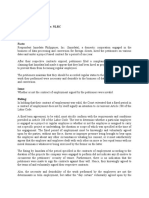








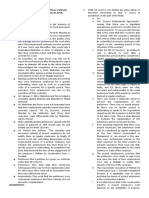













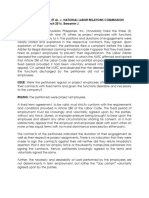



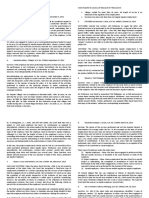
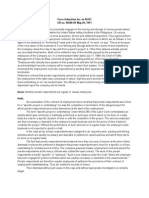

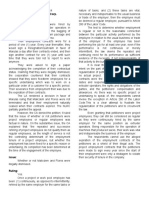







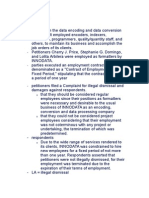













![THE LABOUR LAW IN UGANDA: [A TeeParkots Inc Publishers Product]](https://imgv2-2-f.scribdassets.com/img/word_document/702714789/149x198/ac277f344e/1706724197?v=1)










